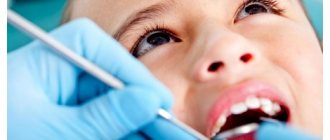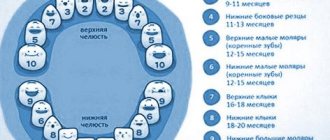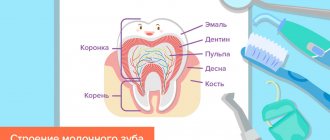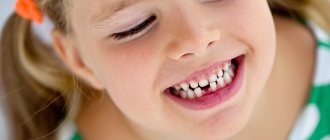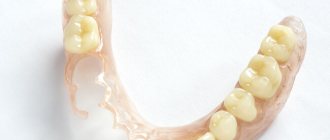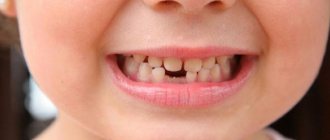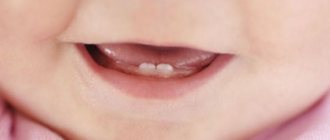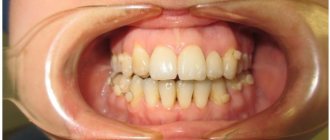The formation of baby teeth is a stressful situation for a baby, to which his body usually reacts with an increase in body temperature. Of course, this happens not only because of teething. It will be useful for many parents to know what to do when their baby suddenly has a fever.
What causes body temperature to rise during the formation of baby teeth?
There is a misconception that a child’s elevated body temperature during the eruption of baby teeth is not normal and therefore measures should be taken to lower it to a normal level. In fact, this is not so. The fact is that at the site of tooth eruption, the body’s immune defense decreases. Harmful bacteria enter the disturbed gum and cause an inflammatory process, which is always accompanied by an increase in body temperature. It should be understood that elevated temperatures have a detrimental effect on harmful microorganisms. Of course, this does not mean that excessively high temperatures during teething are normal.
Parents of the baby should not worry if, during the formation of baby teeth, the baby’s body temperature does not exceed 38 degrees.
In one-year-old babies, the process of tooth formation is much more complicated. It is after the first year of life that a child’s canines and molars begin to form. These teeth erupt much more slowly and, accordingly, increased body temperature can persist for a long time. Their long formation is explained by the uneven shape of the molars and their size. Sometimes it lasts several weeks.
The same situation occurs during the eruption of eye teeth. Their roots are located much deeper than the rest of the baby's teeth. Therefore, the growing eye tooth has to travel a longer path to the gum surface. All this time, the child experiences discomfort, and his body responds to it with an increase in body temperature.
In essence, the emerging baby teeth tear the soft tissue of the gums, and this cannot be painless. In this place, the immune defense is weakened due to injury. During the formation of molars, children often develop a fever. This happens when the impact of harmful microorganisms becomes too powerful, that is, an infectious infection has occurred. In this case, the body temperature rises to 38 degrees, and sometimes above.
Why does the temperature rise
Teething is a traumatic process. Dental units damage the gum mucosa and inflammation occurs, which in medicine is called aseptic (microbial-free). This process is accompanied by an increase in temperature. In addition, during teething, some processes occur in the baby’s body that stimulate hyperthermia:
- at the site of localization of future milk teeth, specific substances necessary for softening the bone tissue of the jaw begin to be actively produced;
- Since all the forces of the child’s body are aimed at teething as quickly as possible, the immune system weakens a little. During this period, infectious agents present in the body may become active and diseases will begin to progress. Many of them are accompanied by an increase in temperature.
Damaged gums are the “entry gate” for infection. Through them, pathogenic microflora can penetrate the body and provoke the development of a septic inflammatory process. The body also responds to such an attack with an increase in temperature. To prevent infection, it is recommended to take more careful care of your baby’s gums during this difficult period for him. Pharmaceutical companies now produce many drugs that have a triple effect - relieve pain, reduce inflammation, fight viruses, bacteria and fungi. But before using these medications, it is recommended to consult your pediatrician.
What is the maximum permissible body temperature of a child during the formation of teeth?
How high a baby's body temperature can rise depends on the condition of his body. During teething, a normal body temperature is considered to be between 37.5 and 37.7 degrees. The maximum permissible temperature is 38 degrees. If it increases further, then measures should be taken to reduce it.
Parents should remember that during the period of formation of baby teeth, the child’s body temperature should be measured more often.
If the child’s body temperature reaches 39 - 40 degrees, this means that urgent medical attention is needed, since, most likely, the infection has penetrated the baby’s respiratory system.
Teething symptoms in older children
By the age of 7-8 years, the second stage of teeth appearance begins. The milky elements fall out and are replaced by radical structures. This process is tolerated by children much easier than in infancy. There is practically no pain syndrome, since there is already a hole in the gum and it is not damaged. But the following discomfort signs may develop:
- aching sensation in the mouth;
- severe itching in the gums;
- insomnia or taking a long time to fall asleep at night;
- lack of concentration, absent-mindedness;
- swelling of the cheek;
- in rare cases, a slight rise in temperature to 37-37.5 degrees.
Negative signs in the child quickly disappear. But it is important to ensure that infection does not penetrate into the hole where the baby tooth used to be. If a child has a tendency to pathology, it is recommended to rinse the mouth with furatsilin, chamomile, and other herbal antiseptics. Most products not only have disinfectant properties, but also relieve inflammation.
Typically, the filling of the oral cavity with radical elements occurs closer to 10 years. In some children the process may occur delayed. But most cases end quickly and painlessly.
How long can an elevated body temperature remain?
There is no clear answer to this question. It all depends on the health of the baby. As for the results of long-term observations, on average, the increased body temperature of a child during the formation of baby teeth persists for one to three days. It is important to note that when the top of the tooth appears above the surface of the gum, body temperature returns to normal. This happens as each tooth erupts.
However, statistics show that in some children, elevated body temperature persists for four or even five days, and the fever can last only a few hours and go away on its own.
Knowing all of the above does not mean that parents should not show their baby to pediatricians. An extra examination by a specialist will never hurt, but, on the contrary, will help identify diseases at the earliest stage of their development.
Diagnosis confirmation
Parents will not always be able to understand why their child’s temperature has risen. Then it is recommended to consult a pediatrician to confirm the diagnosis. At an early stage, pathologies are easier to eliminate. Hyperthermia does not always occur against the background of teething.
When it comes to small children whose baby teeth are just developing, X-rays are not taken.
Excessive radiation negatively affects health. You just need to get examined by a pediatrician or dentist. If the temperature persists for more than 3 days, other negative symptoms occur, a smear is taken to determine the presence or absence of infection. When the doctor cannot accurately determine the cause, the condition continues to worsen, an x-ray is prescribed.
For older children, the range of diagnostic procedures has been expanded. For their age, acute pain when the root elements occur is not typical. The following diagnostics are recommended:
- examination by a pediatrician or dentist;
- radiography of the jaws;
- bacterial culture of a nasopharyngeal swab;
- opening of swollen gums if internal suppuration is suspected.
After completing the diagnosis, the correct treatment is prescribed. Thanks to the examination, the cause is accurately understood without giving the child unnecessary medications. If the discomfort and low-grade fever persist after completion of therapy, laboratory and instrumental examinations are repeated.
What symptoms can accompany high temperature?
During the period of teething, in addition to elevated temperature, the child may exhibit other symptoms. Often at this time, swelling of the gums occurs, which can reach the mucous membrane of the nose. This phenomenon is accompanied by a runny nose and copious discharge of clear fluid from the nose. Swelling most often occurs when the baby's upper teeth erupt.
If the elevated body temperature persists for five days, then you should immediately call a doctor.
You should also know that during teething, babies produce copious amounts of saliva. It is especially pronounced when the lower teeth erupt.
Signs of pathologies in the mouth
More often in infants, increased salivation and low-grade fever mean teething. This is not always true. If the following symptoms appear, it is recommended to look for the disease:
- coating on the tongue (gastritis, colitis);
- white growths on the gums (stomatitis);
- bad breath (pathologies of the gastrointestinal tract, tonsils, adenoids);
- small or large wounds caused by mechanical damage, infection;
- bleeding of soft tissues;
- severe swelling of the cheek caused by the accumulation of exudate in the inner part of the tissue (for example, with flux).
Symptoms develop due to bacterial or fungal infection. Children at this age often chew on foreign objects and toys. If they have sharp edges, there is a high risk of mechanical damage to the gums.
If you are unsure of the cause of the child’s negative condition, it is better to consult a pediatrician.
It is important to identify the infectious process in a timely manner so that bacterial or fungal infection does not spread throughout the internal tissues. This is fraught not only with damage to the mucous membrane, but also with the development of purulent formations. Pathologies are more difficult to treat and are more difficult for the child to tolerate.
Warning symptoms
During the period of teething, the child’s body is weakened and therefore more susceptible to viral or bacterial diseases. At this time, you need to monitor your baby with maximum attention. You should seek help from a doctor if you have the following symptoms:
- The baby's nose is very stuffy and a purulent substance is released from it. Such signs indicate the likelihood of rhinitis, which can only be cured with medication.
- The appearance of diarrhea does not mean that it is directly related to teething. Most likely, an infection entered the child's stomach through toys or a gum teether. The baby should be shown to a doctor.
- During teething, the baby's mouth produces copious amounts of saliva. The child does not always have time to swallow it, and this causes him to cough, or rather, cough. If the cough becomes prolonged, this means that the baby’s respiratory system has become infected. You can’t do this without the help of a doctor.
- It should also be taken into account that teething cannot cause redness in the throat. If this happens, it means that the child has pharyngitis or a general respiratory disease.
- Vomiting at elevated body temperature during teething is an alarming signal. This happens when the nervous system is damaged or due to an intestinal infection. Calling a doctor in such a situation is mandatory.
All of the above symptoms are alarming, even if they appear without elevated body temperature.
Temperature during teething: causes, duration
When teething, the child's body experiences severe stress and reacts to this with an increased temperature. In order not to confuse a common cold and teething fever, you need to know what exactly happens when teeth are cut.
The reason for the increase in temperature during teething Temperature does not just happen. The child’s body reacts in this way to the inflammation of the gums, through which the tooth will soon emerge. At this time, immunity at the site of the future tooth decreases, and various microorganisms begin to become active, which also cause fever. Up to a year, teething occurs more or less calmly and does not cause severe inconvenience, but after a year, when fangs begin to erupt, which take longer to appear, the baby may experience pain, accompanied by fever, for up to several weeks. Often the temperature rises not because of inflammation of the gums, but because of viruses that have entered the body or infection due to reduced immunity. The body uses it to fight them, because they are not able to exist at high temperatures, so they die.
How much can the temperature rise? How much the temperature rises is individual for each organism. Normally, it can vary from 37.5 to 38.5 degrees. It is necessary to measure the temperature every half hour or hour, because in young children it can rise very quickly because their body is not yet able to properly exchange heat. If the temperature begins to reach 39 degrees, you must immediately call an ambulance, because this may mean the appearance of various complications.
Duration Regardless of the examples given, all organisms react differently, so for different children everything can develop according to its own scenario. Usually the temperature lasts 2-3 days and disappears when the tooth erupts. There are also cases when the temperature lasts for 5 or even 7 days, and the temperature can rise and disappear completely after a few hours. Be that as it may, a doctor still needs to be called to examine the baby. To exclude complications and a number of other diseases, so that if something happens, they can be treated as early as possible.
What are the symptoms besides fever? Temperature is not the only sign of teething. At the same time, a runny nose may occur due to the spread of swelling from the gums to the nasal mucosa. This happens when the upper teeth erupt. Also one of the symptoms is excessive salivation and weak stool of the baby.
What symptoms should you be wary of? Due to reduced immunity, the child’s body is not able to fight many viruses and infections. The following signs may indicate their presence: • the nose is very stuffy, and snot flows from it in large quantities. This means that rhinitis has joined the edema, it must be treated; • diarrhea. Very rarely it appears along with a temperature, but it still happens. This could mean some kind of intestinal infection acquired by the baby through toys; • cough. Due to severe drooling, children do not always have time to swallow saliva, so they can sometimes choke on it, resulting in coughing. If the cough is repeated systematically and there are signs of sputum, then inflammation of the respiratory tract has been added to the temperature; • reddened throat. In addition to the nasal mucosa, swelling can also spread to the mucous membranes of the throat. This may mean the appearance of pharyngitis or acute respiratory infections; • nausea and vomiting. They occur at a very high temperature, perhaps this is a symptom of an intestinal infection or damage to the nervous system. If your baby exhibits these signs, you should immediately consult a doctor who will prescribe the necessary treatment, regardless of the presence of fever.
What measures to take in case of high temperature? Many parents begin to give antipyretic and antiviral drugs when the temperature rises slightly. This cannot be done, because you need to allow the body to fight the virus on its own. Abuse of such drugs can lead to addiction, and the body will not be able to cope with infections and viruses on its own in the future. Pediatricians advise not to lower the temperature until it reaches 38 degrees, because you need to let the body fight. If the effectiveness of antipyretic drugs is low, you can wipe the baby with slightly cool water or rub it with an alcohol solution with the addition of vinegar. Sometimes parents resort to a method such as homeopathy, but with the help of these remedies they will not be able to effectively reduce the temperature, although they can generally improve the condition of the baby. If the temperature does not subside for more than 3 days, you should consult a doctor.
Is it possible to walk when there is a fever? If the baby’s health is normal and the temperature is not too high, then a walk in the fresh air will only bring benefits. Only the child needs to be dressed according to the weather. You need to walk calmly so that he doesn’t get overtired. Even if you are sure that the temperature is a consequence of teething, you still need to call a doctor who will make an accurate diagnosis and prescribe the correct treatment. Self-medication in this case is unacceptable, because if you make a mistake, you can harm the baby’s health.
Sign up for treatment and consultation with a pediatric dentist!
Child's body temperature when replacing baby teeth with permanent ones
During the period of loss of baby teeth and the appearance of permanent teeth, the child’s body temperature remains normal. Only some children's body temperature rises when permanent molars begin to form. The reason for this is the size and shape of the molars.
Typically, children's first permanent teeth begin to form at the age of six. If at this time the child’s temperature rises, then there is a possibility of gingivitis. This disease is characterized by inflammation of the mucous membrane of the gums and requires treatment.
Signs of wisdom teeth erupting
Teething does not always happen in children. When it comes to wisdom teeth, the age is determined from 14 years and older. Usually the process is completed by 30-35 years. The molars are large in size and slowly move up the soft tissues. This causes the following negative symptoms in patients:
- increase in body temperature up to 38 degrees;
- an increase in body temperature above 38 degrees, if the eruption of wisdom teeth is accompanied by suppuration of the soft tissues due to the proliferation of infection;
- inability to chew food because the tissues are swollen;
- extensive swelling of the cheek;
- the lesion hurts at any time of the day, but the discomfort intensifies after eating food due to prolonged chewing;
- runny nose caused by the accumulation of immune cells in the nasopharynx during inflammation in the oral cavity.
Most wisdom teeth erupt very slowly. Then the inflammation develops less, the swelling is minimal. If the process occurs at a rapid speed, acute pain occurs. Wisdom teeth are dangerous not only because of their eruption, but also because of the tendency of this area to form gum pockets filled with purulent exudate. This happens when food gets under the gum.
In rare cases, molar eruption may be pathological. For example, the molar is not turned up, but to the side. It damages the adjacent tooth as it grows. It is recommended to remove such elements in a timely manner. They are detected using radiography.
How should parents behave when their child’s body temperature rises?
Many parents, having discovered an increase in the child’s body temperature during the period of teeth formation, try to bring it down with antiviral or antipyretic drugs. Meanwhile, there is no need to rush in such a situation.
A body temperature within 37 degrees should not cause anxiety in parents, since this is the norm during teething, and more precisely, a normal protective reaction of the body. In such a situation, you just need to wait until the body itself copes with the pathogenic microorganisms that have penetrated it.
However, if the body temperature exceeds 38 degrees and the baby experiences attacks of fever, it is advisable to use antipyretic drugs. If this does not help, then the baby should be wrapped in a diaper soaked in a weak vinegar-alcohol solution or simply moistened with cool water.
If high temperature and fever attacks occur for three days, then a medical examination of the baby is necessary. He probably developed some kind of disease that had nothing to do with teething. It is allowed to use homeopathy instead of antipyretic drugs. These drugs cannot reduce body temperature, but at the same time significantly improve the general condition of the baby. This in turn contributes to a speedy recovery. However, the use of homeopathic medicines without the approval of a pediatrician is unacceptable.
Why is high temperature dangerous for a child and when should you sound the alarm?
High temperature (39-40 degrees) is extremely dangerous for children in their first year of life. Because of this, disruption of the central nervous system and heart, and convulsions are possible. A rapid increase over several hours and one that is difficult to bring down with antipyretics is very dangerous.
As a result of a sharp increase, the temperature center of the brain is not able to withstand such a load, which can cause seizures. Children with central nervous system pathology are at risk. They cannot be risked, and the temperature must be brought down as soon as it has already risen to 37.5 degrees.
What to do if your child has a fever?
If, when teething, the child is restless, asks to be held, or cries, there is no need to worry. All parents go through this, you are not the first and you will not be the last. It is much worse if the baby does not react to anything, constantly sleeps and behaves very calmly. When the temperature rises, this is an alarming signal.
In this case, monitor your child with special attention and measure the temperature every hour. This can be done in the crease near the groin or armpit. To do this, it is better to use an electronic thermometer: it will be able to show you the result much faster than a mercury thermometer, in addition, it is more accurate. It is also safer and cannot be broken.
If the child’s temperature cannot be measured this way, it can be done rectally. To do this, lubricate the tip of the thermometer with baby cream, then carefully insert it into the rectum. Pinch the child's buttocks and wait for a signal indicating that the measurement is complete.
Important: when measured in the rectum, the values will always be higher compared to those in the armpit. The norm is a temperature within 37-37.5 degrees. Once you get a score of 38.5 or higher, be sure to shoot it down.
How do you know if your baby is unwell? There are signs that indicate a condition where high fever is dangerous:
- The skin feels dry and hot to the touch.
- Lips become dry.
- Eyes sparkle.
- Cheeks turn red.
- The baby rarely urinates.
If you see them, remember that urgent help is needed, because this condition is extremely dangerous for the child’s body.
Will walking during teething be harmful?
If during the period of teething the child’s body temperature does not exceed 37 degrees, and the baby himself does not suffer much from this, then walks will benefit him. In such a situation, the baby should be dressed for the weather and walked with him away from people to avoid possible infection. You should not get involved in active games at this time.
If the baby’s body temperature has risen above 37 degrees, and he himself does not feel well, then it is better to refrain from walking until he recovers.
In conclusion, let us remind you that self-treatment of children is always fraught with bad consequences. Do not hesitate to contact your doctor again.
What to do if a child has a fever on his teeth?
The presence of a temperature reaction to teething in a small child is a normal protective reaction of the child’s body. This is a natural immune response that helps fight gum inflammation. But if the thermometer creeps to 38 or higher, and there is a deterioration in the child’s general condition, antipyretics should be used after prior consultation with a doctor. Manifestations that require an antipyretic:
- The child’s well-being is noticeably deteriorating: lethargy, sleeps a lot during the day, but is restless at night, is not interested in toys, cries and is capricious;
- Lips become dry, cheeks turn red and eyes shine;
- Rare urination.
- Rapid breathing and irregular heartbeat;
- Convulsions develop.
To avoid maximum body temperatures of the child and the unpleasant consequences of this, you need to do the following:
- The room where the child is located should not be hot, 18°-19° is enough;
- The child's face should be wiped with a damp cloth and the body should also be wiped every two hours.
- Give plenty of fluids (water).
When, despite all the measures taken, the temperature remains at maximum values or fluctuates for two or more days, if the child’s skin turns pale and other unhealthy symptoms develop (vomiting, cramps, diarrhea, etc.), you need to call an ambulance. In all other respects, a low temperature does not in any way restrict the child from walking, eating or playing if his health is good. The only thing is to somewhat limit contact with other children so as not to catch some kind of infection and try not to introduce new foods into the baby’s diet until the baby’s teeth cut through.
How to reduce a child's temperature?
Doctors advise using only one drug from the above - with Paracetamol or Ibuprofen in the composition. If the temperature drops poorly or does not drop at all, such medications can be alternated. But you can’t give your baby the combined drug Ibuklin.
Please note that it is not at all necessary to reduce the temperature to normal. It is enough just to knock it down a little for the baby’s well-being to improve at least a little. Don’t forget to feed your little one, because in case of high temperature the loss of fluid increases. Pediatricians say that babies need to drink 100 ml of water per 1 kg of weight.
Ways to lower temperature at home
- Rubdowns can be done at intervals of 2 hours. Wipe your hands, knees, armpits, and groin area with a soft cloth soaked in water at room temperature. It is important to prevent hypothermia!
- Drinking plenty of fluids is recommended to reduce fever. This will relieve intoxication and protect the child from dehydration.
The main thing that parents of a teething child will need most is patience.
If your child has dental problems, the Dentistry Center will come to the rescue. Experienced pediatric dentists work here who will find an approach to any fidget, and in a playful way will treat children’s teeth using the most modern techniques.
Doctors at our clinic work with visitors of all ages.
